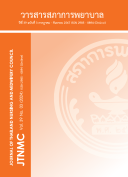Factors Predicting Learning Needs in Patients with Acute Coronary Syndrome
DOI:
https://doi.org/10.60099/jtnmc.v39i03.268455Keywords:
acute coronary syndrome, learning needs, illness perceptionAbstract
Introduction Learning needs are necessary for tailoring self-care education for patients with acute coronary syndrome (ACS). Existing knowledge about factors influencing learning needs among these patients is limited, especially their perceived identity, timeline, consequences, personal control, treatment control, and emotional representation.
Objective To investigate predictive power of perceived identity, timeline, consequences, personal control, treatment control, and emotional representation on the learning needs of patients with ACS.
Design This study employed a predictive correlational design, using the common sense model of illness self-regulation, and literature review as a conceptual framework.
Methodology Through proportional stratified random sampling, the participants consisted of 157 patients diagnosed with ACS, aged 18 years and older, who were admitted to a tertiary hospital in the metropolitan area. Data were collected using a personal data questionnaire, the Brief Illness Perception Questionnaire and the Cardiac Patients Learning Needs Inventory. Reliability was tested using the test-retest reliability and analyzed by the Intraclass Correlation Coefficient (ICC) for perceived consequences, perceived timeline, perceived personal control, perceived treatment control, and perceived emotional representation. The reliability coefficients were .72, .88, .95, .85, .87, and .83, respectively. The learning needs assessment for cardiac patients was analyzed for internal consistency using Cronbach’s alpha coefficient, which was found to be .97. Data were analyzed using descriptive statistics and multiple linear regression.
Results Majority of the participants (75.8%) were older adults, with an average age of 68.1 years (SD = 0.40). Most of them (78.3%) had a high level of overall learning needs (M = 3.75, SD = 0.49), and the highest learning need was physical activity (M = 4.02, SD = 0.61). Multiple linear regression analysis revealed that perceived identity, timeline, consequences, personal control, treatment control, and emotional representation could predict the variability of learning needs in patients with ACS at 53.1%. (F6,150 = 28.259, p < .001). The significant factors predicting learning needs in patients with ACS were perceived timeline (β = .586, 95%CI 5.62-8.64, p < .001), consequences (β = .247, 95%CI 1.73-5.35, p < .001), and treatment control (β = .154, 95%CI 0.17-2.35, p = .024). However, factors that could not significantly predict learning needs in patients with ACS were perceived identity, personal control, and emotional representation.
Recommendations Nurses and health personnel should assess the learning needs of patients with ACS and related factors, particularly their illness perceptions in terms of timeline, consequences, and treatment control, in order to prepare an educational plan to meet their learning needs.
Downloads
References
Tsao CW, Aday AW, Almarzooq ZI, Anderson CAM, Arora P, Avery CL, et al. Heart Disease and Stroke Statistics—2023 Update: A Report from the American Heart Association. Circulation. 2023;147(8): e93-e621. https://doi.org/10.1161/CIR.0000000000001123
Chow CK, Brieger D, Ryan M, Kangaharan N, Hyun KK, Briffa T. Secondary prevention therapies in acute coronary syndrome and relation to outcomes: observational study. Heart Asia. 2019;11(1): e011122. https://doi.org/10.1136/heartasia-2018-011122
Posadas-Collado G, Membrive-Jiménez MJ, Romero-Béjar JL, Gómez-Urquiza JL, Albendín-García L, Suleiman-Martos N, et al. Continuity of nursing care in patients with coronary artery disease: a systematic review. IJERPH. 2022;19(5):3000. https://doi.org/10.3390/ijerph19053000
Niksadat N, Rakhshanderou S, Negarandeh R, Ramezankhani A, Farahani AV, Ghaffari M. Concordance of the cardiovascular patient education with the principles of Andragogy model. Arch Public Health. 2022;80(1):4. https://doi.org/10.1186/s13690-021-00763-5
Hassankhani H, Haririan H, Feizollahzadeh H, Jafari A, Porter JE, O’Brien F. Learning needs of iranian patients with coronary heart disease: a cross-sectional, comparative study. Clin Nurs Res. 2021;30(2):193-9. https://doi.org/10.1177/1054773819898808
Huriani E. Myocardial infarction patients’ learning needs: Perceptions of patients, family members and nurses. Int J Nurs Sci. 2019;6(3):294-9. Available from: https://ejournal.mahidol.ac.th/login?url=https://search.ebscohost.com/login.aspx?direct=true&db=edselp&AN=S2352013218300954&site=eds-live
Haridas J, Mani AL. Perceived Learning needs and readiness for hospital discharge of patients with acute myocardial infarction in a selected hospital, Kottayam. IJISRT. 7(3) 849-851. 2022. https://doi.org/10.5281/zenodo.6418378
Leventhal H, Meyer D, Nerenz D. The common sense representation of illness danger. Contributions to medical psychology. 1980:17-30. Available from: https://www.researchgate.net/publication/303283742_The_common_sense_representation_of_illness_danger
Hagger MS, Orbell S. The common sense model of illness self-regulation: a conceptual review and proposed extended model. Health Psychology Review. 2021:1-31. https://doi.org/10.1080/17437199.2021.1878050
Cohen, J. (1988). Statistical power analysis for the behavioral sciences (2nd ed.). Hillsdale, NJ: Lawrence Erlbaum Associates. https://doi.org/10.4324/9780203771587
Ashour A, Al-Smadi A, Tawalbeh L, Alshraifeen A, Al-Rawashdeh S, Gharaibeh B. Do illness perception predict perceived learning needs among patients treated with percutaneous coronary intervention. Dimensions of Critical Care Nursing. 2020;39(5): 251-8. https://ejournal.mahidol.ac.th/login?url= https://search.ebscohost.com/login.aspx?direct=true&db=asn&AN=144906563&site=ehost-live
Statistical agency THAI ACS REGISTRY I [InternetJ. 2021 [cited 2022 May 5]. Available from: https://www.ncvdt.org/Default.aspx
Borson S, Scanlan JM, Chen P, Ganguli M. The mini-cog as a screen for dementia: validation in a populationbased sample. J Am Geriatr Soc. 2003;51(10):1451-4. https://doi.org/10.1046/j.1532-5415.2003.51465.x
Trongsakul S, Lambert R, Clark A, Wongpakaran N, Cross J. Development of the thai version of mini-cog, a brief cognitive screening test. Geriatr Gerontol Int. 2015;15(5):594-600. https://doi.org/10.1111/ggi.12318
Gerard PS, Peterson LM. Learning needs of cardiac patients. Cardiovasc Nurs. 1984;20(2):7-11. Available from: https://pubmed.ncbi.nlm.nih.gov/6570812/
Uysal H, Enç N. A Turkish version of the cardiac patients’ learning needs inventory; patient questionnaire (TR-CPLNI): reliability-validity assessment. Int J Caring Sci. 2012;5(3):264-79. Available from: https://www.researchgate.net/publication/278283195_A_turkish_version_of_the_cardiac_patients_learning_needs_inventory_patient_questionnaire_reliability-validity_assessment
Smith J, Liles C. Information needs before hospital discharge of myocardial infarction patients: a comparative, descriptive study. JCN2007;16(4): 662-71. https://doi.org/10.1111/j.1365-2702.2006.01689.x
Broadbent E, Petrie KJ, Main J, Weinman J. The brief illness perception questionnaire. J Psychosom Res. 2006;60(6):631-7. https://doi.org/10.1016/j.jpsychores.2005.10.020.
Thepphawan P, Watthnakitkrileart D, Pongthavornkamol K, Dumavibhat C. Cognitive representation, emotional responses and hospitalization experience in predicting decision making for receiving treatment among patients with acute coronary syndrome. Nurs Sci J Thail Nursing Science Journal of Thailand. 2011; 29(2): 111-9. Available from: https://he02.tci-thaijo.org/index.php/ns/article/view/2824 (in Thai)
Downloads
Published
How to Cite
Issue
Section
License
Copyright (c) 2024 The Journal of Thailand Nursing and Midwifery Council

This work is licensed under a Creative Commons Attribution-NonCommercial-NoDerivatives 4.0 International License.








